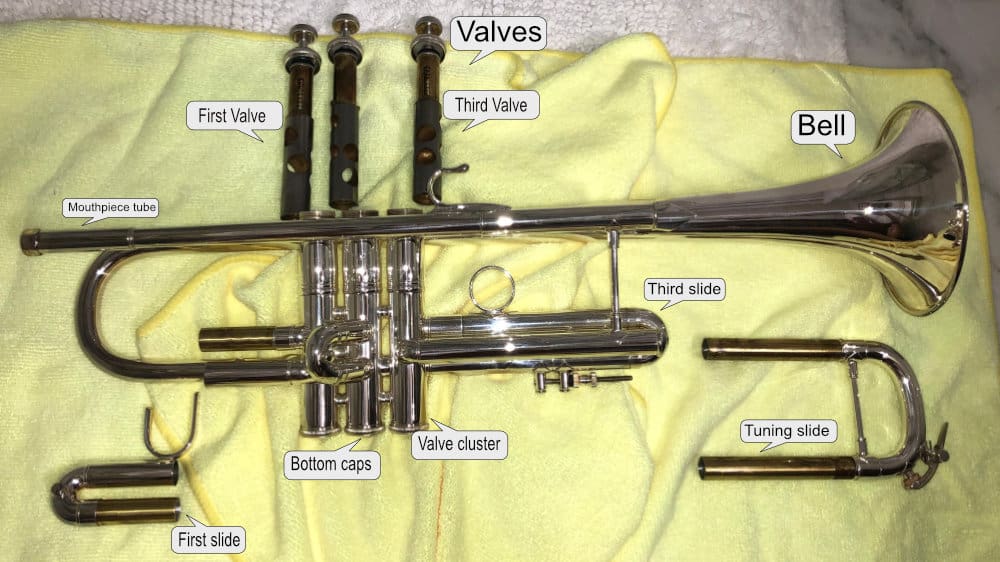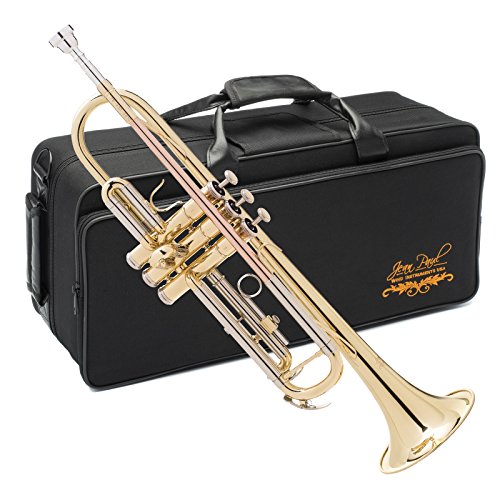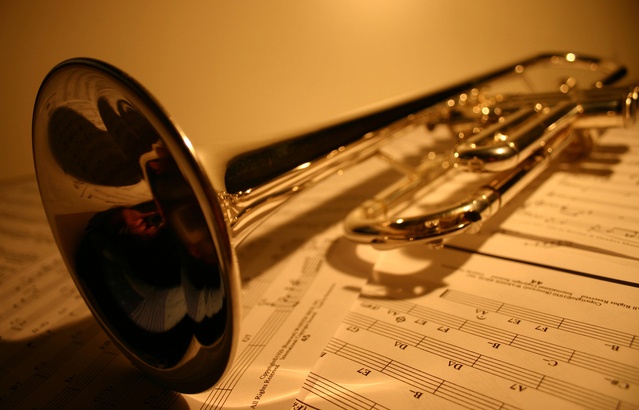Table of Contents
What are the ambitions of the player?
We all start out excited about learning something new. Are you excited because it’s new or excited because you like to play the trumpet? Did you start out on a cornet and want to move up? Do you see yourself playing through college or maybe trying to become a professional? If you aren’t sure this is something you’ll continue to do after high school, a modest investment in a brass instrument is a smart decision. Most of us started playing the cornet in school and by middle/high school we had all moved to the trumpet. If you have some experience playing and are showing natural talent, then investing in a better trumpet would be recommended. That way you can upgrade to a trumpet that you know will fit your talent once you’ve really developed your abilities.
How Much Does A Beginner Trumpet Cost?
What does a trumpet cost? A trumpet that sells for under $500 is best if you are a beginner or student that is looking to stop renting or using a loaner trumpet. A trumpet that sells for between $500 and $1,000 is best if you are a better beginner or intermediate trumpet player. Above $1,500 you are looking at professional trumpets. These are best for you If you are an intermediate level trumpet player that wants a trumpet that will work well for the rest of your trumpet playing career or you are a comeback player that has the funds to invest for the long term. Most trumpet players that purchase a trumpet in the sub $1,000 range eventually upgrade to a professional trumpet after a few years. For more information about professional trumpets, see what is The Best Professional Trumpets.
What to look for in a beginner trumpet?
Options such as a tuning slide on the first and/or third valve can be found on trumpets in all price ranges. The first valve tuning slide will have a thumb saddle. Sliding it outward makes the notes sound lower to stay in tune with other players. This is important when playing in a band or orchestra. The types of trumpets best suited for a beginner are “beginner trumpets” or a “student trumpets”. When we all started out, the school usually had “beginner instrument” quality horns for use. They are designed to take the abuse of being used for many years by many different students. They are not designed to sound or play beautifully like a higher level brass instrument. They are designed for longevity in a tough environment. As such, these are not the type of horn you want to invest in. If you have experience playing the trumpet for a year or more, an “intermediate trumpet” is recommended. A horn listed as a “professional trumpet” is a high quality trumpet which may be a great choice if you are developing quickly. Please review our Best Professional Trumpet brands post and review the questions we pose about your musical journey. It’s a serious investment so please take the time to ask yourself these questions.
What specifications are important?
The first specification To look at is what key is the trumpet in? The most common and popular key for a trumpet is B-flat. This means when you play the note “C”, it is the same note as “B-flat” on a piano. The next specification is the bore size. This is how big the tubing is. A larger bore size takes more air to support the notes. The most popular bore size is Medium-Large or ML which is 0.459 inches in diameter. Most beginners start with a Medium Large bore. You’ll also find many professionals play top of the line professional level trumpets with a Medium-Large bore size.
What Is A Trumpet Made Of?
The features between different trumpets vary by the maker of the trumpet. The big ones are:
- The type of metal the piston valves (the part that goes up and down) are made of.
- The type of brass that the leadpipe (the tube that the mouthpiece goes in to).
- The types of water keys or spit valves.
- The type of brass the bell is made of.
The material finish found on the valve pistons most touted as the best is Monel. The other materials are stainless steel pistons and bronze pistons. All of these refer to the metal plating or coating on the piston valve itself. Which one is better is something that has been debated for decades. Monel is used in highly corrosive situations. Our saliva (aka spit) is highly corrosive. Think about it, it’s what starts the digestive process of that cheeseburger. It has been used in airplane parts for this reason. It’s also more expensive and harder than stainless steel. Most experienced trumpet players believe that as long as you keep the piston valves clean and well oiled, you should enjoy smooth valves.
The leadpipe or mouthpiece tube gets the most saliva from playing as it is closest to the mouthpiece. The tubing can be made from rose brass or yellow brass. Yellow brass is what the rest of the trumpet is made of. Choosing a horn that has a rose brass leadpipe or nickel silver is good because these metals are more resistant to corrosion from being wet all the time. The image below isn’t ‘technically’ accurate as the “Mouthpiece tube” label is pointing at a part called the receiver. It’s what accepts the mouthpiece. The tube after that with the pinky hook on it is the leadpipe. A water key or spit valve is always on the main tuning slide. Rose brass is also highly regarded for the slightly warmer sound it produces. An uncommon and desirable feature is a water key or spit valve on the third valve slide. It’s rare as even many high-end, professional trumpets don’t have them. No matter what your leadpipe is made of, emptying your trumpet of moisture (aka spit) after you play is critical to the life of your horn. Also swabbing out your horn after each playing session will really help. And don’t forget to regularly do a full cleaning of your horn. Below is my horn as I prepared to give it it’s monthly cleaning. Okay, it’s been a few months.

The bell of the trumpet is usually made of yellow brass or gold brass, Some models feature a rose brass bell. Rose brass has more copper in it and produces a tad more warm sound. If you’d like to have additional flexibility to change the sound of the musical notes you make, you can change to a different mouthpiece. A deeper cup mouthpiece will make a warmer sound. A shallower cup mouthpiece will make a more penetrating sound. Most beginners start with a 7C mouthpiece which has a medium cup. The 7C is considered a great starter mouthpiece for a student or younger player in elementary or middle school. That is because the size (Rim Diameter) is 16.20 millimeters. For an older student, you may want to try the Vincent Bach 1 1/2 C which has a rim diameter of 17.00 millimeters. Both have a medium cup which is a good to start on to develop a proper embouchure.
For more information on mouthpieces, please see our Trumpet Mouthpiece Guide.
Are Silver Trumpets Better Than Brass?
Trumpets are mostly made of brass (really?). Guess that’s why they are called brass instruments. There are 2 main finishes that are put on the brass to protect it. One is lacquer which can be yellow, gold, or rose in color. A gold lacquer finish is the most common. The other common finish option is silver plating. Which is best is a personal choice that you make. A lacquer finished trumpet is slightly less expensive than it’s silver-plated counterpart. The lacquers used today usually have some epoxy in it to make it much stronger than the lacquer from decades ago. The pros of a lacquer finish trumpet is that it may sound warmer as the bell won’t vibrate as much. This is because the lacquer coating is slightly thicker than the silver plating. The trumpet may feel slightly lighter in weight. The cons of a lacquer finish are that it’s a little less durable than a silver plated trumpet. Lacquer is a little more prone to scratching, cracking, and peeling. A silver plated finish on a trumpet will be slightly heavier which makes for a more penetrating, full sound. This means the same trumpet may have a brighter sound with a silver finish. I found that when I had one of my trumpets reconditioned, I had it silver plated as the old lacquer finish was trashed from decades of use. It “felt” a bit brighter than before, but that’s me going from memory. The pros of a silver plated trumpet are that the finish can last a lifetime if cared for regularly as it is quite durable. The cons are that it is more expensive than lacquer and will require regular polishing to prevent or remove tarnishing. For more information, Yamaha Music USA has an excellent article: Brass/Woodwind Instrument Finishes and Their Effect on Tone Quality.
What about Trumpet Accessories?
The accessories to look for are a mouthpiece (usually a 7C mouthpiece) and a sturdy carrying case. The Vincent Bach 7C trumpet mouthpiece is the most common one to start with as a student or young player. Please see the Vincent Bach Mouthpiece guide for more information. Please review our Trumpet Mouthpiece Guide for more information. A polishing cloth for the finish of the horn would also be nice. Valve oil for the 3 piston valves and slide grease will be needed. Please see our Best valve oil guide which also discusses slide oil and grease. Some beginner trumpets also include gloves to help protect the finish. Many of my bandmates (and I) use fiber channel clothes to hold our horns when we practice. This keeps the acids from the sweat on our hands from attacking the finish. Here’s our list of the Best Trumpet Accessories Under $50. There’s also a Beginner Trumpet Accessories Checklist.
Is there a Warranty?
Like your car, the longer the warranty the better. Like all musical instruments, brand name trumpets are built with quality and are tested before leaving the factory. If you purchase a reputable brand trumpet, the warranty that comes with it is for your peace of mind should anything go wrong. All the trumpets recommended here are fully tested at the factory before being shipped.
Affiliate disclosure: As an Amazon Associate we earn qualifying purchases. This is to help support this site. This means if you click on links on reviewed products, we may earn a small commission on your purchase from Amazon. Please note that your price does not increase because of this. Thank you in advance for supporting the band.
Best Beginner Trumpets: Buying Guide
Best Beginner Trumpet: Value Pick
Jean Paul TR-430
This trumpet has features found on more expensive horns. It’s one model up from their entry level trumpet. It features higher quality materials in the lead pipe and the piston valves at not much more of an investment. Its leadpipe is made with Rose Brass to resist corrosion and provide a full, rich sound. It has both a first and third valve slide. The third slide is adjustable to fit different hand sizes. It also has a third valve water key or spit valve. It comes with a 7C mouthpiece, gloves, heavily padded case, cleaning cloth, and valve oil. It comes with a 1-year warranty and is tested twice for quality and performance before leaving the factory. It comes in either a yellow brass lacquer finish or for a little bit more money, silver plating. To see and hear this trumpet being played, please see the video below from Jean Paul USA.


Eaststar 380
This is great trumpet to get started or come back to. The value you get for a small investment is impressive. The features:
- First and third valve slides.
- An adjustable third valve ring to fit your left hand perfectly.
- Main and third valve spit valves.
- A 7C Mouthpiece.
- A case, gloves, cleaning kit, polishing cloth, and valve oil.
It’s a very complete setup to start playing right away. It has a 0.459 bore size which is Medium Large and comes in either a lacquer finish or nickel plated (silver) finish. The difference in price is rather small. While it may not have the higher end materials of the Jean Paul TR-430 above, it is a great value. Make sure to check out both before you decide.


Best Beginner Trumpet: Best of the Best
Yamaha YTR-2330
Yamaha is highly regarded for the quality of its musical instruments. For more information about Yamaha, please see our post in The Best Professional Trumpets. This trumpet has been improved year over year with many players using this horn their whole career. It has Monel alloy piston valves usually found on more expensive trumpets. The 2nd and main tuning slides are designed and built the same as their professional trumpets which makes this trumpet easy to play with great sound quality. It has both a first and third valve slide. The third slide is adjustable to fit different hand sizes. It also has a third valve water key or spit valve. The hard case is solid and well cushioned. It comes with a TR-11B4 mouthpiece. Its specifications make it similar to a 7B which means the cup is slightly shallower than a 7C. It comes with a 5-year warranty which is usually found on professional model trumpets. This trumpet comes in either a yellow/gold epoxy lacquer finish (model YTR-2330) or silver plated (model YTR-2330S). Here’s a link to Yamaha USAs Overview for the YTR-2330 and YTR-2330S Trumpet.


Vincent Bach TR300H2
The Vincent Bach company makes the trumpet that every trumpet player knows about, the Bach Stradivarius Professional trumpet. It is arguable the most popular trumpet in the world. The good news is they produce an student model that has many great features. The Vincent Bach TR300H2 even has two features that the Professional Stradivarius model doesn’t, a Red brass leadpipe which adds warmth to the sound and has a higher resistance to corrosion. It also has a spit valve on the third valve that the Professional Stradivarius doesn’t. The seamless all yellow brass bell produces a clear, warm timbre. The 0.459 Medium Large bore is easy to play. The first and adjustable third valve slides allow you to stay in tune. The adjustable third valve makes it easy to adjust to your personal hand size. The stainless steel valves are smooth and will last the life of the instrument given their resistance to corrosion. The case felt lined hard case will protect it from the abuse of being hauled to and from school and lessons. It comes with the most popular mouthpiece for beginner trumpet players, the Vincent Bach 7C. To keep the costs down, we suggest the Lacquer finish.

Best Beginner Trumpet: Bargain Pick
Medini MTT-30CN Nickel Plated Intermediate Trumpet

This is one model up from their most popular entry level trumpet. It’s slightly more expensive, but the features far outweigh the extra cost. How is it better? First, its leadpipe is made with Rose Brass to resist corrosion and provide a full, rich sound. Second, it has dual braces (instead of one) on the main tuning slide which focuses the sound while making it much more durable. Third, the bell is nickel plated which is much more durable than a yellow lacquer finish. Forth, it has an adjustable third valve slide stop. This allows you to set the amount the third valve slide extends, something found on very high-end professional trumpets. Fifth, it has Monel piston valves. Lastly, this trumpet comes with an electronic tuner with a metronome (to keep time to music), a folding stand, polishing cloth, gloves, valve oil, and a 7C mouthpiece. It comes with a nylon covered hard case and a 1-year warranty. Here’s an overview from the manufacturer, Cecilio.


